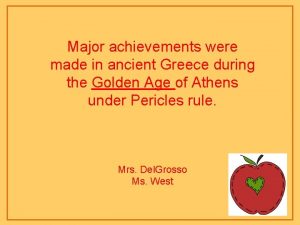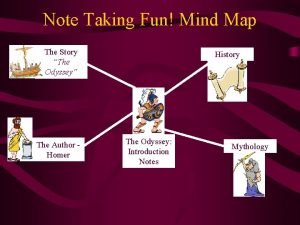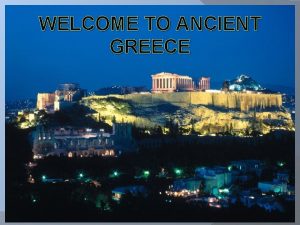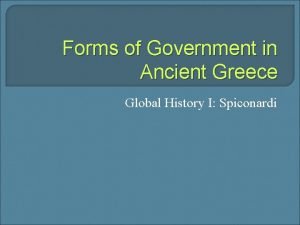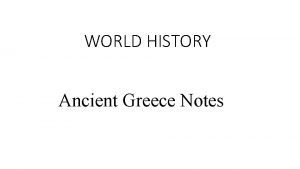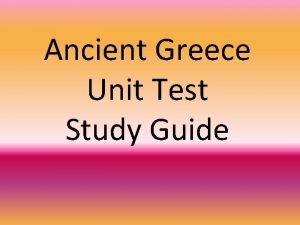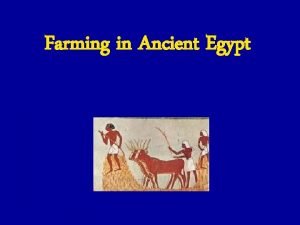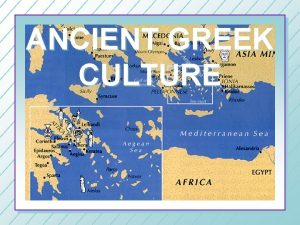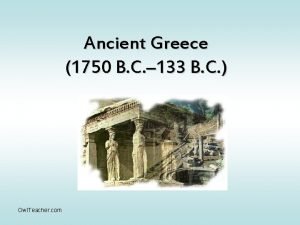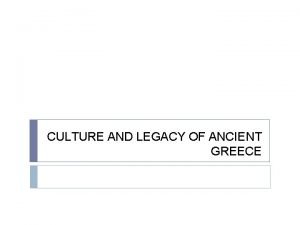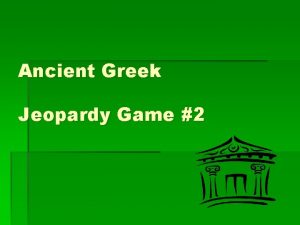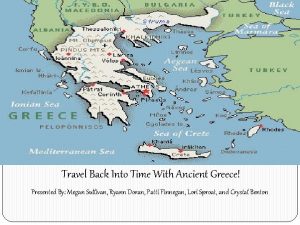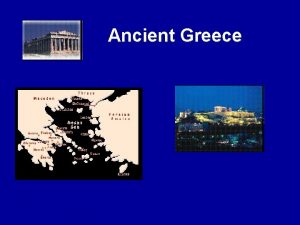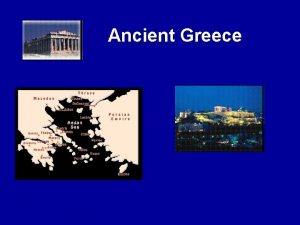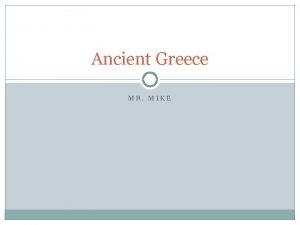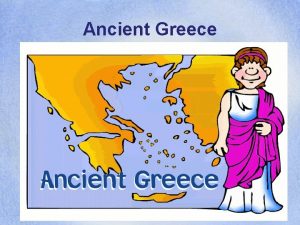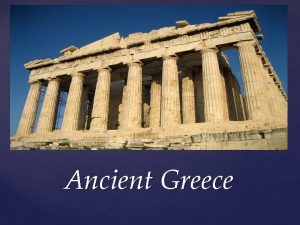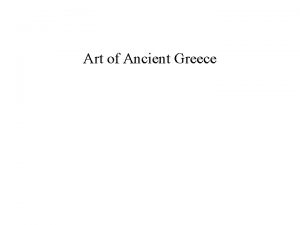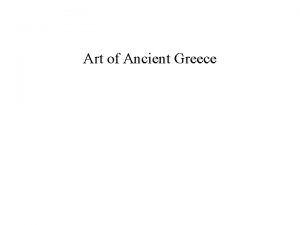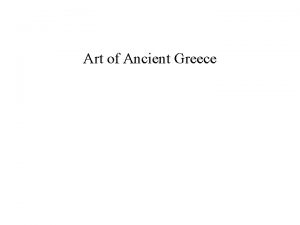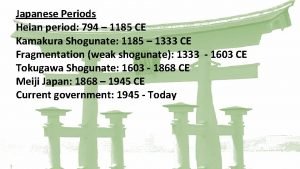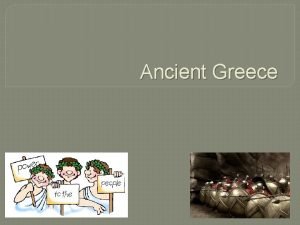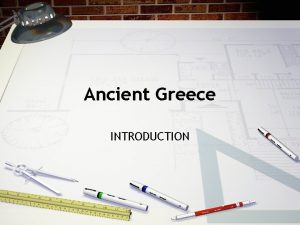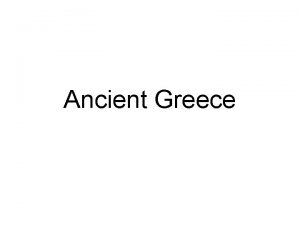Ancient Greece 3 Major Periods of Ancient Greece
















- Slides: 16

Ancient Greece

3 Major Periods of Ancient Greece Civilizations 1. Early Civilizations: Minoans (Crete) and Mycenae (mi se ne) 2. Classical Greece (flourishing of arts, literature, philosophy; domination by Sparta and Athens) 3. Hellenistic Age: Macedonian Empire and Alexander the Great

Early Greeks: The Minoans c. 3200 -1100 BC n n n Lived on the island of Crete Great navigators and farmers Palace led political, social and economic organization at Knossos Artistic expressions and grand construction Built sanctuaries

THEORIES FOR DECLINE OF MINOANS n n n 1750 BC- earthquake destroys Minoan palaces 1628 BC- volcano erupts at Thera/Santorini 1400 BC- War between Minoans and Mycenaeans led to decline of power

Domination of the Mycenaeans c. 1700 – 600 BC n n Mycenaeans took control of Crete at Knossos by 1500 BC Myceneans controlled mainland Greece = main political center was Mycenae More interested in war as pottery and grave sites reflect hunting, weapons, armor and war as well as fortified palace walls Slowly Minoan culture and traditions disappeared

THEORIES FOR DECLINE OF MYCEANEANS n Shift in climate leading to drought forcing Myceanans to migrate to more fertile lands n Tribe of nomadic warriors from north of Greece (Dorians) destroyed Mycenaeans

Trojan War n • Was the Trojan War a real historical event or merely a legend in Mycenaean history?

Trojan War n n n Two epic poems by Homer “Iliad” and “Odyssey” describe the Trojan War Approximately 1194 -1184 BC Greece vs Troy Helen of Sparta + Paris of Troy “the face that launched a thousand ships” Achilles, Odysseus, Hector, Agamemnon and the Trojan Horse • Archaeologist- Heinrich Schliemann (claims that he found Troy and the early Greek civilization of Myceaneans)

Archaic Period 750 – 500 BC Significant events 1) national literature (Homer) 2) 3) 4) 5) 6) rebirth of trade colonization of Sicily and Italy Olympic Games -776 BC Stone sculptures of human figures rise of city states (polis)

Classical Greece (500 – 336 BC) n n Polis (city states) = all had its own form of government, laws and money (Corinth, Thebes, Athens, Sparta) Construction of Parthenon and Acropolis Full development of democracy under Pericles of Athens Classical age of Greece produced great literature, poetry, philosophy, drama, philosophical thinkers and art

THE PERSIAN WARS n The Persian War (500 -479 BC. ) n Cyrus and Darius controlled Anatolia n Darius’ Invasion n The battle of Marathon, 490 BC. n Greeks led by Spartans and Athens battled Persia to a draw n Xerxes Invasion n To fight Persians, Athenians built a wall of wood, or a navy n Xerxes seized, burned Athens n The battle of Thermopylae, 480 B. C. E. Leonidas guards Thermopylae with 300 Spartans, 700 Thespians, 400 Thebans. q Athenian navy destroys Persian in the battle of Salamis, 480 n BC. Persian army retreated back to Anatolia, 479 B. C.

PELOPONNESIAN WAR n Pericles Rebuilds Athens n Athens experiences a Golden Age n 30 Year Civil War (431 -404 B. C. E) n Athens and Allies vs. Sparta and Allies n Costly victories/defeats and plague wreck city n Unconditional surrender of Athens, 404 B. C. . n Hegemony first by Sparta and then by Thebes n Constant warfare between leagues, allies n Spartan hegemony replaced by Theban n Greece horribly weakened n Athens remained intellectual center of Greece

n n n RISE OF MACEDONIA The kingdom of Macedonia n A frontier state north of peninsular Greece n Partially Hellenized society Philip of Macedon (re. 359 -336 B. C. ) n Built a powerful army, overcame the power of clan leaders n Brought Greece under control by 338 B. C. Alexander of Macedonia and his conquests n Educated by Aristotle gifted in many areas n At age 20, Alexander succeeded Philip n Invaded Persia, controlled Ionia and Anatolia, 333 B. C. n By 331 B. C. , controlled Syria, Egypt, Mesopotamia n Invaded Persian homeland burned Persepolis n Crossed Indus River by 327 B. C. n Died in 323 B. C. at age of 33

ALEXANDER’S EMPIRE

Hellenistic Era: Greece n n Period between conquest of Persian Empire by Alexander the Great to establishment of Roman power The word, Hellenistic, is derived from the word, Hellene, which was the Greek word for the Greeks. The Hellenistic age "hellenized" the world Spread of Greek culture and language throughout Near East, Mediterranean and Asia Minor Exported Greek culture: architecture, politics, law, literature, philosophy, religion, and art as models of perfection

Legacies of Greece n n n n City states (polis) Thought & Philosophy Greek Language Politics Democracy Great Thinkers Art and architecture Myths and literature
 What were the major achievements of ancient greece
What were the major achievements of ancient greece Ancient greece mind map
Ancient greece mind map How was tyranny government practiced in ancient greece
How was tyranny government practiced in ancient greece How was oligarchy practiced in ancient greece
How was oligarchy practiced in ancient greece Ancient greek society values
Ancient greek society values Physical education in sparta
Physical education in sparta Map of sparta greece
Map of sparta greece Ancient greece unit test
Ancient greece unit test Ancient greece map balkan peninsula
Ancient greece map balkan peninsula What crops did ancient greece grow
What crops did ancient greece grow Humanism in ancient greece
Humanism in ancient greece Ancient greece 1750 b.c-133 b.c answers
Ancient greece 1750 b.c-133 b.c answers Culture and legacy of ancient greece stations
Culture and legacy of ancient greece stations Mottarne
Mottarne Ancient greece jeopardy
Ancient greece jeopardy Where was ancient greece located
Where was ancient greece located Ancient greek philosophers final jeopardy
Ancient greek philosophers final jeopardy
